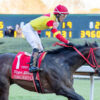Playing the horses involves a certain degree of skill. However, it’s still a form of gambling, and some punters may develop unhealthy wagering patterns. Unsurprisingly, that affects the way a local gambling industry performs as well, as you’ll see from our comparison of the US and UK markets.
Our guide will help you better understand how your gambling choices can affect you in the long run. We’ll share some experienced-backed errors that are easy to slip into and explain a few simple, responsible gambling strategies that you may put into practice to keep horse betting in the entertaining zone.
One of most-watched and wagered on sports
Horse racing is among the top spectator’s choices in many regions of the world, including the US and the UK. While in the States, horse racing viewership may have declined, it still produces a solid turnover. By comparison, in Britain, the sport still ranks second in popularity, having behind a tradition that dates back to Roman times.
Watching the jockeys race to the finish line without wagering on the race’s probable outcome is almost beyond comprehension in any part of the world. Betting is at the heart of visiting the racetrack, and most punters go about with their hobby safely, seeing it as a way to spice up the watch.
How is the UK different?
While in the States, horse betting and all forms of gambling are regulated at a local level, the UK’s gambling industry is governed by a single regulatory body, the United Kingdom Gambling Commission (UKGC). All gambling operators and players alike must conform to the same set of rules, which creates a framework of implicit trust.
Responsible play is an essential part of how gambling is conducted within this framework. That may be why the UK horse betting industry segment seems to perform better than its US counterpart. While we could identify multiple other causes for the UK gambling industry’s success as a whole, the moderate increase in fairness and trust is undoubtedly the main driver.
Responsible advertising, a growing number of horse racing tracks, and many law-abiding operators to choose from, both online and offline, must also be at the heart of this industry segment’s growth.
What can you do?
The ball is in your court. Even though gambling laws and government agencies do a lot to protect you, you should take the time to scrutinize your gambling patterns. Read on and discover the main signs that your perceptions are misleading you.
5 Signs that you may be steering off track (and solutions to get back)
- You visit the racetrack as a way to make money
The first worrying sign for a punter has to do with their attitude. If making money is why you visit the horse racing track, you open yourself up to potentially disillusioning situations. No matter how skilled you think you are, betting always involves a fair share of risk.
Avoid disheartening experiences at the racetrack and try to separate betting from investing.
How to tackle this tendency?
You might object that stock trading involves risk, too. Furthermore, crypto investments are inherently more volatile, and people still make fortunes engaging in such activities.
Point taken. You may study your horses well and use data analysis to refine your selections. Still, your main aim should be entertainment, not generating profit.
- Playing the horses is your main leisure activity
Do you find yourself dedicating a lot of your spare time to playing the horses? How about other leisure activities? If playing the horses takes most of your free time, that’s a clear sign you’re not gambling responsibly.
Your family and friends likely had something to say about your behaviour. As a consequence, you may have tried to hide your gambling. Still, you can’t hide the truth.
People can see when gambling is all that’s on your mind. You’re constantly checking your phone, following some dubious race on another continent. When there’s a race in town, you’re the first to buy tickets.
Get back on track!
You shouldn’t let any form of gambling take too much of your spare time—balance horse betting with other forms of entertainment. Suppose you’re always on the lookout for betting tips, continuously analyzing horses, calculating probabilities and so on. In that case, you’re missing out on what life has to offer.
Keep some of your spare time ‘spare,’ and limit activities that have to do with gambling. If you’re playing the horses online, you can easily activate session limits or at least reminders to help you keep your sessions within reasonable limits.
- When you lose, you feel remorseful
Another typical pattern shared between problem gamblers or players at risk of developing an addiction is feeling guilt or remorse after losing a bet.
Many factors can lead to a lost wager, and you must accept that not all of them are within your control. For example, weather conditions may influence the outcome of a race. Or a jockey may have a bad day at the office.
The solution?
However, some factors are indeed in your control. Placing bets compulsively will most likely lead to what’s known as ‘bet regret.’
Prevent such unpleasant feelings by playing only for entertainment. Stick to a clearly defined battle plan. Limit risk by tweaking what you can control, but don’t fall into despair when your wager’s a loser.
- You place ever-riskier parlays without adequately assessing your chances
As per the Responsible Gambling Council, if you’re in the 18-24 age group, you’re more likely to engage in riskier wagers. Since the part of the brain responsible for assessing risk is not fully developed until age 25, this factor alone can make you bet more haphazardly.
But being young is not the defining trait of a problem gambler. Many horse race punters outside the 18-24 age group will confess to spending their money on excessively ambitious bet slips. To a certain degree, these wagers are built into horse betting and are part of what makes this activity exciting.
However, abusing Exacta, Quinella, Trifecta or Superfecta wagers will most likely drain your bankroll quickly.
Stay in control!
Stick to the standard, safer wagers. That doesn’t mean you should only place Win, Place and Show bets. But it’s advisable to try your luck at longer odds only when you’re ahead. Don’t try to recover prior losses with exotic bets, as that’s a recipe for disaster,
- You don’t have a clear-cut budgeting strategy
If you don’t find yourself in the previous 4 situations, there’s a strong chance you will in this one. While many punters will spend within their budgets, they still don’t have a proper strategy to limit their spending.
There’s some nuance to this. At worst, you gamble money that you can’t afford to lose. For example, you let your bills unpaid to gamble or gamble precisely to get the required cash to meet specific obligations.
An even more dreadful scenario can occur. You borrow money to finance your trips to the horse racing track and spend your last penny there.
How to create a budget?
The first step in creating your horse betting budget is assessing your income. How much money do you make monthly? Grab your phone and calculate 10% of that sum. Your gambling budget should never cross this threshold.
Once you’ve established your budget, it’s time to set up a wagering plan. Divide your available bankroll into 1% units. Stick to betting 1-2 units per bet slip.
Another crucial part of budgeting is taking regular breaks. If you gamble those 2 units continuously, you defeat the whole purpose of creating a budget. Thus, take frequent breaks and stop before it’s too late.
Wrap-up
When you’re on a losing streak, it’s always better to take your time and assess the situation. That’s what sets apart amateur punters from betting pros, the ability to stick to the plan even during nasty streaks. Put our tips into practice, and always remember that when the fun stops, you need to stop!











